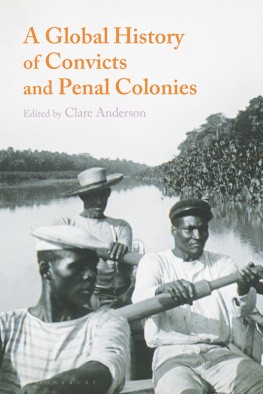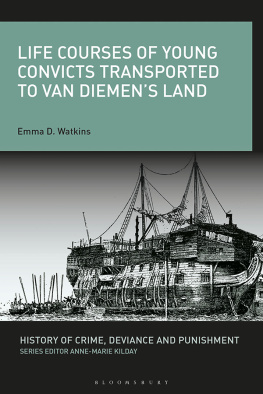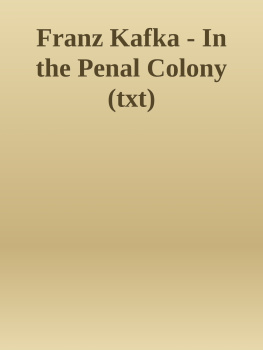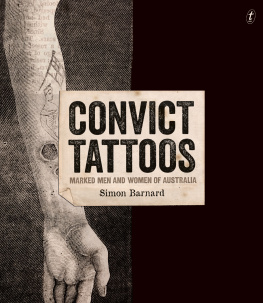A Global History of Convicts
and Penal Colonies
A Global History of Convicts
and Penal Colonies
Edited by
Clare Anderson

For Ian Duffield
Every effort has been made to trace copyright holders and to obtain their permission for the use of copyright material. The publisher apologizes for any errors or omissions and would be grateful if notified of any corrections that should be incorporated in future reprints or editions of this book.
Figures
Maps
Tables
Clare Anderson is Professor of History at the University of Leicester, UK. She works on the history of convicts and penal colonies, particularly in South and Southeast Asia, the Indian Ocean and Australia. She has published widely in the field, including Subaltern Lives: Biographies of Colonialism in the Indian Ocean World, 17901920 (2012), and Legible Bodies: Race, Criminality and Colonialism in South Asia (2004).
Sarah Badcock is Professor of History at the University of Nottingham, UK. Her research focuses on Russia in the late Imperial and revolutionary periods, comparative perspectives on punishment, free and unfree labour and penal cultures. She has written A Prison without Walls? Eastern Siberian Exile in the Last Years of Tsarism (2016) and Politics and the People in Revolutionary Russia; A Provincial History (2007).
Timothy J. Coates is Professor of History at the College of Charleston in South Carolina, USA. He studied global early modern history at the University of Minnesota, where he received his PhD in 1993. He has published three monographs on forced labour in the early modern and modern Portuguese world; his most recent book is Convict Labor in the Portuguese Empire, 17401932 (2014). He is also the co-editor of a series of classic Portuguese historical texts in translation, publishing (with foreword by M. N. Pearson) the first translation of Diogo do Coutos The Veteran Soldier in 2016.
Christian G. De Vitos current research addresses convict transportation and convict labour in the Spanish Empire (sixteenth to twentieth centuries). He has published extensively on global labour history, on the social history of twentieth-century psychiatry and prisons, and on the combination of microhistory and global history. Christian is co-coordinator of the Free and Unfree Labour Working Group of the European Labour History Network (ELHN), co-chair of the Labour Network of the European Social Science History Conference (ESSHC) and vice president of the International Social History Association (ISHA).
Ryan C. Edwards work explores the intersection of environmental history, geography, and science and technology studies in Latin America. Funding from Fulbright and the Social Science Research Council supported his current research on Patagonia and the Ushuaia penitentiary-penal colony in Argentina. His articles have appeared in the Hispanic American Historical Review and the Journal of Historical Geography. Edwards received his PhD from Cornell University and is currently Assistant Professor of History at the University of Tennessee at Chattanooga, USA.
Mary Gibson is Professor of History at John Jay College and the Graduate Center, City University of New York, USA. Her publications include Prostitution and the State in Italy (1986), Born to Crime: Cesare Lombroso and the Origins of Biological Criminology (2002) and Global Perspectives on the Birth of the Prison, American Historical Review (2011). She has translated, with Nicole Hahn Rafter, the two classic works of Lombroso: Criminal Man (2006) and Criminal Woman, the Prostitute and the Normal Woman (2004). Mary is currently completing a book on the birth of the modern Italian prison.
Johan Heinsen is Associate Professor of Early Modern History at Aalborg University, Denmark. His teaching and research is focused on the colonial, maritime and penal history of the DanishNorwegian Empire. His publications include the monograph Mutiny in the Danish Atlantic World: Convicts, Sailors and a Dissonant Empire (2017).
Hamish Maxwell-Stewart is Professor of History at the University of Tasmania, Australia. His interests include the use of penal transportation by Western empires as well as the impact of penal transportation to Australia on life expectancy and offending patterns for convicts, their children and grandchildren. He is the author of a number of books including the prize-winning Closing Hells Gates (2008).
Judith Pallot is Professor Emeritus of Geography at the University of Oxford, and Official Student and Tutor of Christ College Oxford, UK. Judith has published widely in the field of Russian and Eastern European studies, including most recently (with Elena Katz) Waiting at the Prison Gate: Women, Identity and the Russian Penal System (2017), and (with Laura Piacentini) Gender, Geography and Punishment: The Experience of Women in Carceral Russia (2012).
Ilaria Poerio earned her PhD in Italian Studies from the University of Reading, UK, in 2015. Her research interests include fascism, antifascism and political violence. She has recently published A scuola di dissenso. Storie di resistenza al confino di polizia (192643) (2016), Postcards from Italy. Ventanni di berlusconismo sulla stampa britannica (2013) and she has co-authored Vento del Sud. Gli antifascisti meridionali nella guerra di Spagna (2007). In 2016, Ilaria was awarded a La Motta Chair Visiting Fellowship at Seton Hall University, USA.
Minako Sakata is Associate Professor of History at Tomakomai Komazawa University, Japan. She studies the history of Hokkaido and Ainu oral tradition. Her publications include Kotoba ni yoru ikusa: aidentit o kaketa Ainu no nagai tatakai, in Hiroyuki Shiode, ed., Kron to ksai no higashi ajia kindai (2016), and Ainu ksh bungaku no episutemoroj: rekishi no hhtoshiteno Ainu sanbun setsuwa (2011).
Jean-Lucien Sanchez holds a PhD in History on the penal colony of French Guiana from the cole des Hautes tudes en Sciences Sociales, Paris, France. He is Researcher in History at the French Ministry of Justice (DAP/SDMe5), Associate Researcher at the Centre de recherches sociologiques sur le droit et les institutions pnales (CESDIP) and member of the Centre pour les humanits numriques et lhistoire de la justice (CLAMOR). Jean-Lucien is a member of the editorial board of Criminocorpus and the author of A perptuit. Relgus au bagne de Guyane (2013).
Ann Laura Stoler is Willy Brandt Distinguished University Professor of Anthropology and Historical Studies at The New School for Social Research, New York, USA. Ann researches the politics of knowledge, colonial governance, racial epistemologies, the sexual politics of empire and ethnography of the archives. Her numerous publications include: Race and the Education of Desire: Foucaults History of Sexuality and the Colonial Order of Things (1995), Carnal Knowledge and Imperial Power: Race and the Intimate in Colonial Rule (2002, 2010), Along the Archival Grain: Epistemic Anxieties and Colonial Common Sense (2009) and most recently Duress: Imperial Durabilities in Our Times (2016).
Matthias van Rossum is Senior Researcher at the International Institute of Social History in Amsterdam. He works on global labour history with special interests in maritime labour history, coercion in labour relations and the dynamics of labour conflicts and social relations. In 2016, he was awarded a NWO Veni Grant for research on the history of the slave trade and enslavement in early modern Dutch Asia.
Next page






